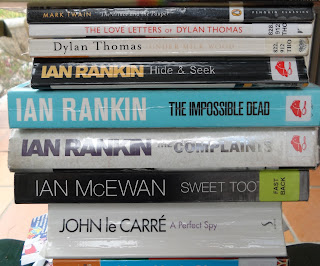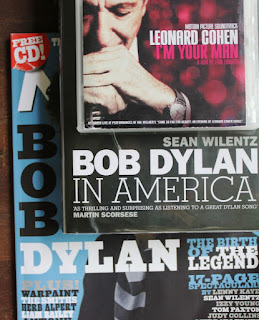It's Summer. Time to pull out a chair, find a shady spot, and read away the hot muggy days.
If only life was that simple.
One of the books in the pile is called 'the long thaw'. This may be so in the northern hemisphere, but i fear it's more the long slow roast, this season of the heat down under.
The thunderbolt kid. Bill Bryson. I’d rather read his other books. Such as-
Seeing Further: The Story of Science and the Royal Society. Bill Bryson (ed) has done a lot to bring the story of science to a popular audience. The list of authors here is impressive and eclectic: novelists such as Margaret Atwood; historians including James Gleick; and some of the most recognisable faces in modern British science: Richard Dawkins. These distinguished writers offer their take on the achievements of science.
In
The Elegant Universe Brian Greene writes a book to explain in simple, non-mathematical terms what superstring theory is or what is known so far. It goes through the history of modern physics and cosmology, and comes highly recommended to anyone who has ever gazed at the heavens and wondered. Just don't expect to read it in a weekend. (What’s ‘superstring’? I thought it was a kind of shoe lace that does not come loose while running. But you learn something new everyday).
In
The Long Thaw,
David Archer, one of the world's leading climatologists, shows how, burning our planet's carbon, impacts on our climate for millennia. Archer argues that it is not too late to avert dangerous climate change--if humans can find a way to cooperate as never before.
On its release in 2007,
Mark Bowen’s
Censoring Science caused a bit of a stir. The book is about the gagging of NASA climate scientist James Hansen and his foiled attempts to warn the public about the dangers of global warming. It exposes the U.S. government’s resistance to adopt meaningful environmental policy. This book is a must-read for environmentally and politically conscientious readers. To date Hansen despairs that no real progress is being made on global warming.
Eaarth.
Bill McKibben has spearheaded a global campaign to put the latest science at the heart of the global talks on climate change. He proposes 'maintenance' over 'growth' or 'expansion' as a guiding principle, but is not optimistic of the role of government in an economically broke, climate-changed world. McKibben’s solutions are mainly community-based and focused on meeting our top-line needs: food and energy; and small, smart, labour-intensive natural systems.
Eureka!: Scientific Breakthroughs That Changed the World. In this collection of twelve scientific stories,
Leslie Horvitz describes the drama of sudden insight as experienced by twelve great minds, from Darwin, Einstein, the team of Watson and Crick, and to lesser known luminaries.
Rainbow Pie: A Redneck Memoir. Joe Bageant is a commentator on the politics of class in America. He reminds that everything exists within a wider political context and his memoir is peppered with monologues on the politics of class, economics and religion in his beloved USA. Rainbow Pie is a social history of a class of America, a testimonial to how America has lost its way. He is not subtle in his harangue of corporate America. This follows his 2007 book, Deer Hunting with Jesus: Dispatches from America's Class War.
The Age of the Warrior.
Robert Fisk is probably the most celebrated foreign correspondent in Britain, and rightly so. This selection of his journalism finds him at full throttle against a host of familiar deserving targets: Bush, Blair, the Iraq war, Western policy towards the Middle East. Fisk's pessimism is not even tempered when he regards his own colleagues. Fisk is accused of going over the top in his indignation. This book has 500 pages of truthful scorn. If only there was more journos like him.
Curious Pursuits.
Margaret Atwood is my latest favorite writer. She said:
"You learn to write by reading and writing, writing and reading."
This selection of reviews, speeches, essays and obituaries - dating from 1970 to 2005 is a joy to read. In some ways this book is a sketch of the writer's life and foregrounds. She was also a dedicated and voracious reader, finding shelves of classics in the family cellar and freely working her way through them. Atwood explains that if she doesn't like a book she doesn't review it. I wish i could do the same.
True Blue.
David Baldacci’s books have worn out their welcome.
The Essential Dixie Chicks. ‘Mississippi’ did not make the cut, but ‘Not ready to make nice’ did.
1001 songs you must hear before you die. The editor says it himself: "preferences can be hopelessly subjective". I agree with maybe 10.01% of the songs here. Or is that 1.001%? I was never good at music, let alone Maths.
How To Make Gravy.
Paul Kelly. The Bob Dylan of Australia writes the stories about his songs and his music. Kelly muses about the places, characters and musicians that inspired him.
Our Kind of Traitor.
John le Carre. An English couple on holidays in the Caribbean meets a Russian millionaire who is fanatical about tennis. The Russian has a hidden agenda which becomes apparent to the lovers. Another enjoyable thriller about espionage that le Carre has been producing since the 1960s.
Downunder: Live In Australia is a live album by Scottish folk musician
Bert Jansch. The concert was recorded over two nights at the Continental Café in Melbourne.
Wellsprings.
Mario Vargas Llosa. The 2010 nobel prize winner writes about his inspirations.
Solar.
Ian McEwan. A novel about when human frailty contends with the times.
The Reversal.
Michael Connelly. The DA of
The Lincoln Lawyer and
The Brass Verdict teams up with his detective half-brother, and ex-wife, to prosecute the retrial of a child murder. My patience has about ran out with Connelly.

















.JPG)
.JPG)
+(1280x997).jpg)
+(1034x1280).jpg)
.jpg)
.jpg)
.jpg)
.jpg)
.JPG)

















